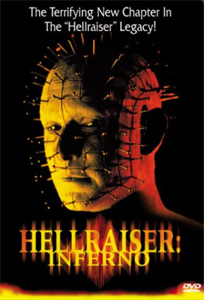The saga’s first straight-to-video entry, and fifth overall, “Hellraiser: Inferno” (2000) might appeal to casual “Hellraiser” fans more so than die-hards. In a respectable full-length debut, director Scott Derrickson and his co-writer Paul Harris Boardman (who would team up again for “The Exorcism of Emily Rose”) use the Puzzle Box and Hell dimension as metaphors for the moral struggles of a detective investigating what we viewers know is a “Hellraiser”-style killing.
Straight to video, but not straight to Hell
While this is a Z-grade “Seven” at times – with overly showy camera work, an inconsistent score, and acting that ranges from quite good to awful – I ultimately got into it. Craig Sheffer (“One Tree Hill”), who I can imagine narrowly losing out on the role of Angel to David Boreanaz, plays police detective Joseph.
He’s one of the film’s good actors, able to overcome well-meaning style or character choices that don’t quite connect, like Joseph’s rare hardboiled voiceovers or his beating of a snitch to get the next piece of information. Making this case of a missing child personal are his wife and daughter, who are more like decorations as Derrickson weaves amid surreal style and grounded substance.

“Hellraiser: Inferno” (2000)
Director: Scott Derrickson
Writers: Paul Harris Boardman, Scott Derrickson
Stars: Craig Sheffer, Nicholas Turturro, James Remar
“Inferno” (oddly titled, as it has nothing to do with fire) is refreshing – especially after the bleak “Bloodline” — in that it has characterization and arcs and it’s not all drenched in misery. Other solid actors are Nicholas Turturro as partner Tony, James Remar as the department’s internal psychologist, and Sasha Barrese as Daphne, a prostitute who becomes the first victim.
Hell as a metaphor … that comes true
Derrickson keeps the Hellraiser mythology present yet does not drown a viewer in it. “Inferno” uses “the Lament Configuration” (the name of this specific Puzzle Box) and “Cenobite” (the name of Pinhead’s species of demon) in dialog, but it doesn’t expand the mythology much – except to give Pinhead (Doug Bradley) story-specific powers.
Rather than yanking a Box-opener straight to Hell, Pinhead sometimes likes to draw things out to movie length via psychological torture. He has robust powers to put false images into Joseph’s mind. Ultimately, the “Hellraiser” mythology functions as a metaphor for Joseph’s ordeal, except that by the end it’s not a mere metaphor.
The production design is pretty great for a straight-to-video film, with Joseph and his partner probing grungy dives, hovels and a nursing home. Even more importantly to the saga’s core fans, the practical makeup effects continue to be excellent. “Inferno” spends less time on grisly torture imagery – although there is some – and more time on almost sexualized but mostly hideous Cenobites (or visions of Cenobites?).

While uneven as a work of art, and not quite something that will haunt my nightmares, “Hellraiser: Inferno” offers a degree of pleasure. The story doesn’t need to be told in the “Hellraiser” universe, but because it is, it gets enhanced. I’m not surprised Derrickson and Boardman went on to be respected names in horror.

